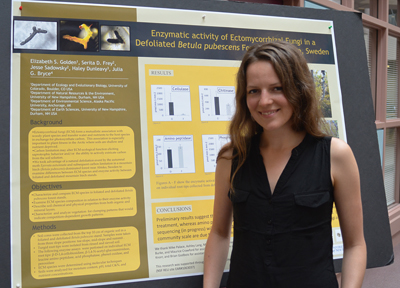 |
|
Elizabeth Golden
University of Colorado, Boulder
Geology major
I am from Rawlins Wyoming and I study Geography (major) and Ecology and Evolutionary Biology (minor) at the University of Colorado at Boulder. During my time at UCB, I have worked and conducted undergraduate research in the Aridlands Ecology Laboratory (UCB). In the future, I would like to study soil microbial processes and ecological functions in harsh environments (deserts, alpine and polar regions).
My research in Sweden will focus on ectomycorrhizal fungi (ECM) and the effect of a natural defoliation event on ECM community structure and ecological function in a mountain birch- (Betula pubescens) dominated, sub-Arctic ecosystem. ECM colonize the roots of most woody plants, forming a mutualistic association in which ECM transfer nutrients and moisture from soil to the plant in exchange for photosynthate carbon. It has been proposed that if this flow of carbon from plant to ECM is diminished or halted, the ECM may demonstrate saprotrophic behavior and act to decompose roots. Additionally, ECM, previously thought to be a passive interface between plant roots and soil, may actively 'mine' nutrients from soil through the production of organic acids and enzymes. Ultimately, ECM may play a significantly greater role in nutrient and biogeochemical cycles than previously assumed.
In order to address these questions and provide insight into the ecological roles of ECM, I will sample colonized root tips from mountain birch trees on a gradient of defoliation, ranging from healthy to completely defoliated. Through the use of enzyme assays and DNA extraction and sequencing, I will be able to describe and match enzymatic activity to individual ECM species in the context of defoliation of host species and associated carbon limitation. I will also characterize the soil (OM content, macro/micro nutrients/pH, profile, etc.) and vegetation of the sampling sites.
 |
Elizabeth Golden with research poster "Enzymatic activity of Ectomycorrhizal Fungi in a Defoliated Betula pubescens Forest near Abisko, Sweden. |
|

